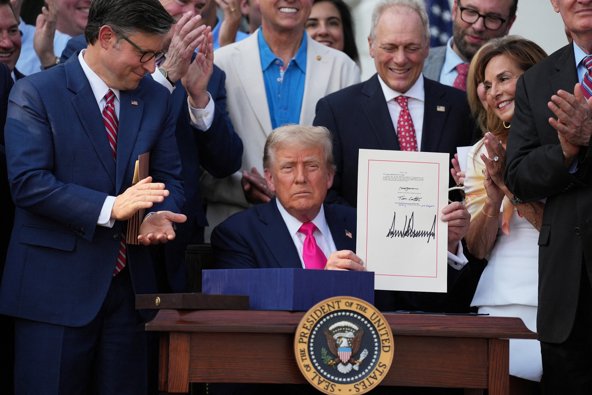
Senate Advances Trump’s $9B Clawback Bill Despite Opposition
Senate debates Trump’s $9B clawback bill targeting USAID and public broadcasting as Democrats warn of deeper social cuts ahead.
Senate Engaged in Lengthy Debate Over Trump’s Clawback Bill
The U.S. Senate is nearing final passage of President Donald Trump’s $9 billion clawback package, following dramatic late-night votes and intense floor debate. The package aims to rescind nearly $8 billion in funding from the U.S. Agency for International Development (USAID) and more than $1 billion from the Corporation for Public Broadcasting, which funds NPR and PBS.
Republicans broadly support the rescissions, arguing that they cut “woke” programs and unnecessary spending, a message that has become central to the party’s midterm strategy. Senate Democrats, however, have fiercely opposed the measure, warning that the bill is only the beginning of deeper cuts to healthcare, food assistance, and energy programs, and that it sidelines Democrats from key legislative processes.
Senate Minority Leader Chuck Schumer called the cuts “just a piece of a larger Republican puzzle,” cautioning that “other democratic safeguards will no longer be around” if such measures proceed unchecked. He criticized the process for excluding meaningful debate and accused Republicans of prioritizing the interests of billionaires over ordinary Americans.
GOP Leaders Defend Bill as Essential Reform
Despite last-minute efforts to win over moderate Republicans by carving out $400 million in global HIV and AIDS funding, three GOP senators—Lisa Murkowski, Susan Collins, and Mitch McConnell—defected, requiring Vice President JD Vance to cast his sixth and seventh tie-breaking votes of the year. Murkowski argued that the White House was effectively directing Congress, undermining its legislative authority.
Senator Collins supported responsible spending cuts but demanded greater transparency regarding which programs would be affected and what the consequences of the rescissions might be. McConnell, too, insisted on more clarity, saying, “They would like a blank check. I don’t think that’s appropriate.”
Republican National Committee Chair Michael Whatley has spotlighted the so-called “big beautiful bill” as the centerpiece of the GOP’s agenda for the upcoming midterms, emphasizing tax cuts, regulatory relief, border security, and new Medicaid work requirements. The legislation makes Trump’s 2017 tax rates permanent, eliminates taxes on tips and overtime, and introduces major changes to social safety net programs. While supporters claim these reforms are critical to reining in government spending and delivering on campaign promises, Democrats warn of dire consequences for vulnerable Americans.
As the Senate prepares for a final vote following another round of amendment debates, the outcome is likely to influence the broader political landscape and set the stage for further battles over federal spending, social policy, and the limits of executive power in the months ahead.






